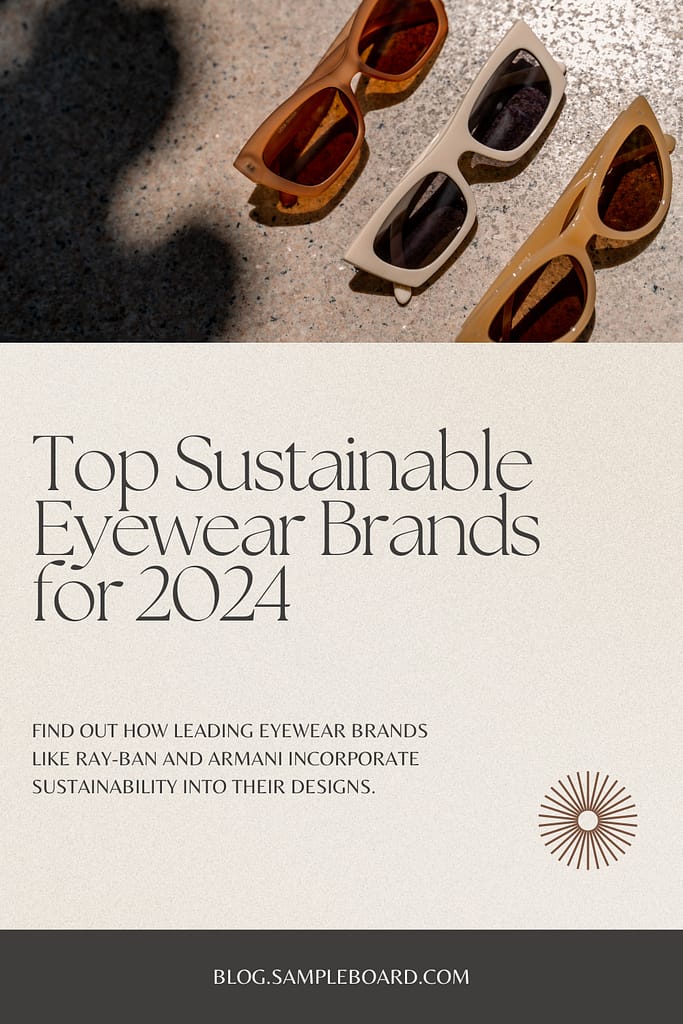Last Updated on October 15, 2024 by SampleBoard
Are you contemplating sustainable eyewear?
A global shift in consumption patterns is currently being observed, with more consumers considering brands' sustainability efforts as contributing to their purchasing decisions.
According to research by Harvard Business Review, Gen Z and millennial customers, like you, are 27% more likely to buy from a brand that cares about its impact on people and the environment.
Your choices shape consumption's future, and sustainability efforts promote trust, which ultimately drives consumers' buying decisions.
Customers' rising sustainability demands have prompted many industries to adopt and promote environmentally friendly manufacturing practices.
One example is the eyewear industry, which, as reported by Earth 911, is responsible for up to 250 metric tonnes of discarded reading glasses annually in North America alone.
Today, more eyewear brands are prioritizing sustainable materials for their product offerings.
By choosing sustainable eyewear, you're making a fashion statement and contributing to significantly reducing environmental waste.
If you're an eco-conscious consumer who needs sustainable eyewear, here are four brands to check out.

Eyebuydirect is an online eyewear retailer that provides access to a wide range of eyewear – from premium brands to more affordable options.
Eyebuydirect offers sunglasses and glasses made from environmentally friendly materials and processes, such as the 5 TO SEE collection, which contains specs like Moonglade made from five recycled plastic bottles.
The online retailer also offers glasses like Tyga from its eco-friendly wood collection that limits plastic waste from further damaging the environment.
Creating frames that are made with recycled and thoughtfully sourced materials is a step in the right direction toward achieving sustainable production.
Ray-Ban, a staple luxury sunnies brand since 1936, has also hopped on the growing trend of incorporating sustainability efforts into eyewear production.
The Reverse collection of Ray-Ban sunglasses features iconic models like Aviators and Wayfarers with lenses and temples that extend inward instead of outward, one of the biggest switch-ups in the eyewear industry.
This innovative approach offers a refined touch to classic eyewear design and showcases the brand's commitment to sustainability.
The collection is crafted with sustainable and bio-based materials like nylon lenses with 41% bio-based carbon content.
The brand has also upgraded the classic Wayfarer by using bio-acetate frames made up of 67% eco-friendly materials from plant-based sources like wood pulp and cotton, thus minimizing plastic waste.
The Italian luxury house Armani, composed of the Giorgio Armani and Emporio Armani labels, has also produced eco-conscious eyewear.
Today, Armani provides sustainable eyewear collections to promote renewable sources in developing fashionable sunglasses.
The Giorgio Armani label released its first Bio Capsule collection, featuring the Women's Bio-Acetate sunglasses with frames made of biodegradable materials.
Meanwhile, Emporio Armani released the SS21 Bio Based story, which features frames made with biodegradable bio-acetate in recycled polyester packaging.
This ensures the luxury market can still enjoy quality eyewear while promoting sustainability.
Oakley is a household name for innovating sports sunglasses, but did you know that the brand also has sustainable sunnies?
Oakley's patented BiO Matter frame material is made with environmentally friendly castor bean bio-resin.
Oils extracted from biodegradable castor beans can be a more sustainable alternative to harmful petrochemicals.
This makes Oakley's Reedmace and Castel sunglasses, which both feature a BiO Matter frame, more sustainable yet as durable as all other sunnies from Oakley.
Be sure to check these frames out if you're looking for sustainable specs that you can use for outdoor activities.
As more consumers become more eco-conscious with their purchases, brands should consider fashionable eyewear and manufacture sunnies while considering the environmental impact.
If you enjoyed this article, you might also enjoy our piece, Creating A Greener Home: The Ultimate Guide To Sustainable Home Decor.